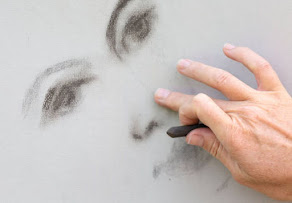An Isolated Incident
A short story by Mary M. Isaacs.
The door buzzer sounded three times, with a fourth buzz a little after the first three. He clicked on the timer he always carried and then hurried to the front door to look out the peephole. He saw the back of a man walking away from the door. As he watched, the man climbed into a delivery truck and then drove away. They never looked back at his door; he wished one of them would sometime, and maybe wave or acknowledge his existence some way or another.
Looking down, he saw the familiar plastic bag on the front porch. I wonder what it is tonight? he thought. He used to play a guessing game about the contents, but that was getting a little old now. He continued to look at the bag as he waited for the timer to go off.
When it did, he unlocked the door (Why do I bother locking it? he asked himself. Who’s going to come in?) opened it and picked up the bag. It felt heavier than usual. Probably pasta, he thought. Any meat portions were so small as to lessen the usual weight of the bag.
After closing the front door, he carried the bag to the kitchen, opened it, and removed the contents. Yep, it was pasta all right; the container was unmistakable.
He wiped the inside of the bag with a paper towel and then set it aside. He was responsible for cleaning it and all the containers and putting them back outside—empty--to be picked up at the next delivery. Empty, because he was required to eat everything he was given. Once, early on, he had sent back some food he didn’t like. It showed up as the next meal delivery, with nothing else added. He’d been annoyed and sent it back once more, untouched. Sure enough, it appeared again for the next meal. Being extremely hungry by then, he ate it. It was only borderline digestible by that time, but he had no choice.
His garbage was inspected regularly, and any discarded food brought a quick negative response. He didn’t want to go through that again, either. There was also no garbage disposal in the kitchen sink, and he had only a bedside commode in his apartment—no toilet. His personal waste products, in plastic bags, were collected daily. They were probably inspected, too, to make sure he hadn’t thrown any food in there. He didn’t envy the people who had THAT job. He knew what to do with things he really couldn’t stomach, but he had learned to eat a lot of the things he used to reject.
Tonight’s meal was almost totally edible. He only had to pick out the green peas in the pasta—he couldn’t stand canned green peas. Fortunately, they would be easy to get rid of later.
After he had eaten there was little to do. He avoided watching TV or listening to the radio; he’d had as much of their edited programming as he could take. He did turn it on, though, at a low volume—in case they were monitoring the amount of time he watched. He tried to ignore it. The available books and magazines were boring now, after having been read through several times, but he wouldn’t get new ones until next week. Exercise was a possibility, but he’d already spent a couple of hours doing that earlier in the day. It wasn’t his day to have a bath—the 3-minute shower this morning was his personal washing allotment for the day. Oh well, at least he had the disposal of the green peas to look forward to. He just had to wait until it was dark.
When that time came, he put the peas into his drinking cup and quietly opened the sliding glass door that led to the backyard. The yard was very small, not much larger than his kitchen, and was fenced all around, with completely unscalable, 10-foot fencing (his estimate). Just outside the door there was a small concrete slab with a bench on it, for getting (relatively) fresh air and sunshine, but the rest of the area was just dirt. He quietly paced off a certain distance and then crouched and dug a shallow furrow with his hands. He spread the peas out at the bottom of the trench and then covered them with the dirt. He pressed it down with his foot and then scuffed it up a bit, to look as if it had been untouched. He idly wondered what he’d do when he ran out of food burial space but decided that the first things he’d disposed of would surely be decayed by then, so he could start over. By now, he had no real expectation of ever being allowed to leave the compound (as he called it—or perhaps it really was one) until he was carried out of it in a shroud.
He suddenly froze in place, letting his awareness stretch out beyond his body. He’d heard nothing obvious but had felt something, some presence. As he stood silently, there was a soft whirring sound overhead. He looked up into the starless blackness—too much pollution—and thought he saw a faint flash as something moved towards the back fence.
He remained motionless, no longer feeling anything strange, but conscious of a deep apprehension inside. Drone? he wondered, and then pushed that thought aside in denial. His expression remained sober as he went back inside, however.
The next day was like the previous one, like all the others since they had moved him into the apartment. But on the second day following, he discovered a printed note on the mat under the letter flap in his front door. Med/tech visit already? he thought, as he scanned the message. But he had long ago stopped keeping track of the days--as they seldom varied--so he could easily be wrong. He undressed and got ready, putting on mask, gloves, and paper tunic, and waited for the knock on the door. How many Hazmat suits would he see this time, he wondered? Well, it made a change.
When the buzzer sounded two times, he was ready to go.
They opened the door to let him back inside. After the door shut, he turned automatically, to look out the peephole. The suits lumbered back to their van, got in, and drove away—with no backward glance. He was alone again. Even though no one talked to him the entire time, at least there had been other human beings around him; he treasured that awareness, for as long as it lasted.
He removed the mask and gloves and ripped off the now-wrinkled paper tunic. They went into the garbage bag as usual. He re-dressed himself in the uniform he’d worn earlier, as it wasn’t laundry day. That was another thing that had taken some getting used to—wearing the same clothes over and over and over and over again. It did promote extra care while eating, however, to avoid wearing spilled food for days—so there was that.
Maybe I’ll sit outside for a while, he thought, and walked to the sliding glass door. It wouldn’t open. He pulled harder but nothing happened. He banged on the door; all at once, a metallic voice said, “Privilege denied”. Startled, he looked confusedly around the room and out into the yard--then he noticed it: the dirt part had been dug up, he could tell immediately. The dirt was in piles and depressions, not smooth as he’d left it a few nights earlier. Why had they gone into his back yard? Why had they been digging? Had they found the buried food? As his eyes scanned the entire yard, he knew they had to have found it. So he wasn’t to be allowed outside again--ever? Or just for a while? He could guess the answer… And now he’d have to eat everything they brought him; his disposal site was unavailable.
With a sharp sense of loss, he sat on the only chair in the room. There was nothing left to do but watch the shadows creep slowly over the disturbed earth as the sun went down.
The door buzzer sounded three times, with a fourth buzz a little after the first three. He clicked on his timer and walked to the front door to look out the peephole. He saw a man climbing into a delivery truck. As it drove away, he wondered what would be in the food bag tonight. When the timer went off, he opened the door and picked up the bag. It seemed heavier this time.
He carried the bag into the kitchen, opened it, and removed the contents. He wiped the inside of the bag with a paper towel and then set it aside. He opened the largest container and stopped, puzzled. What was that greyish stuff inside? It was unrecognizable. He opened more of the numerous containers—all the contents were unrecognizable, and there was a strong smell coming from most of them. In the last container, there were some dirt-covered green peas. All at once, he knew what they’d given him for dinner, what they expected him to eat.
And he couldn’t send any of it back.
Copyright 2021 -Mary M. Isaacs
(from a forthcoming book)







No comments:
Post a Comment